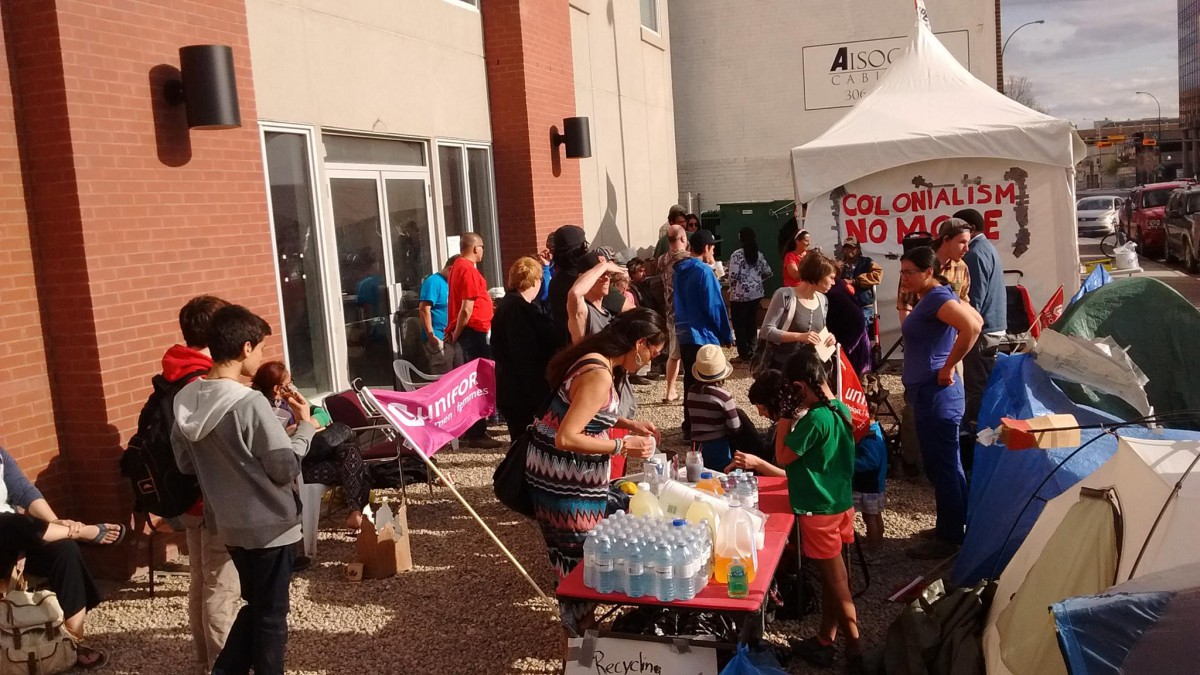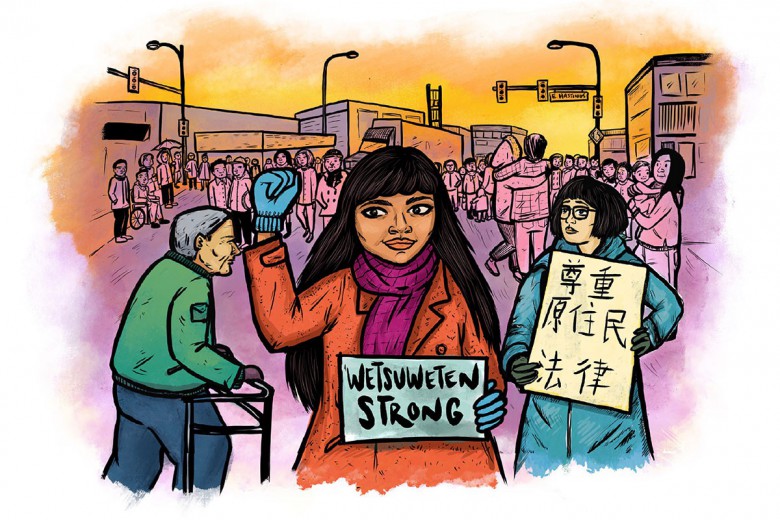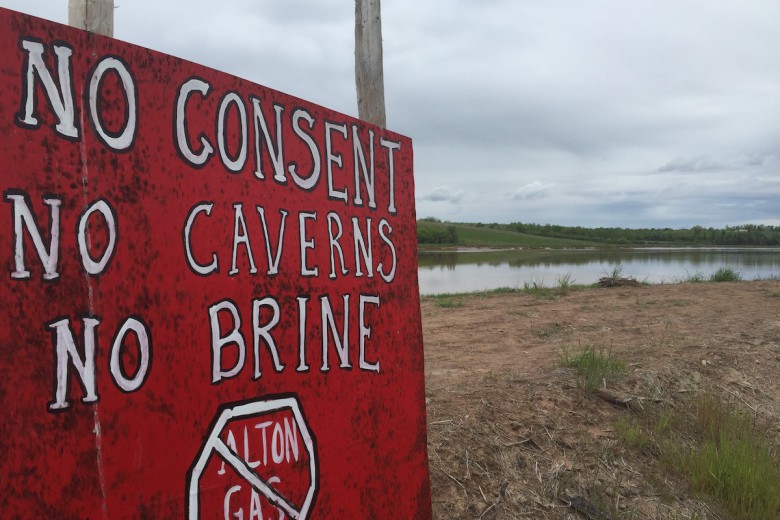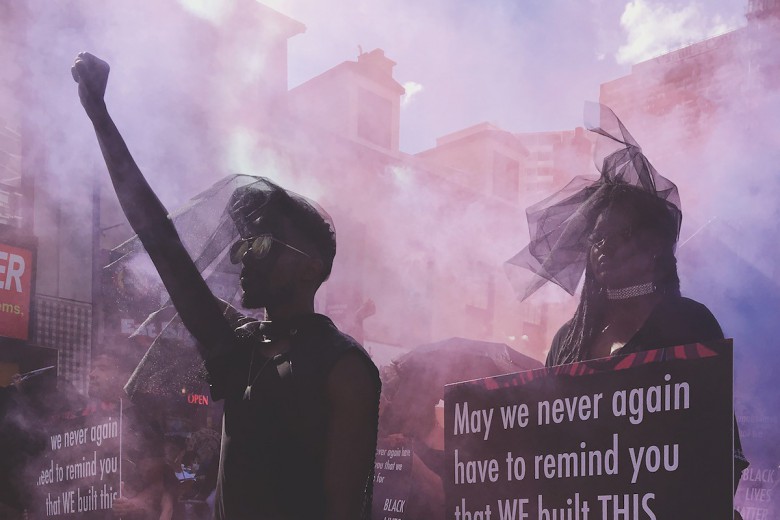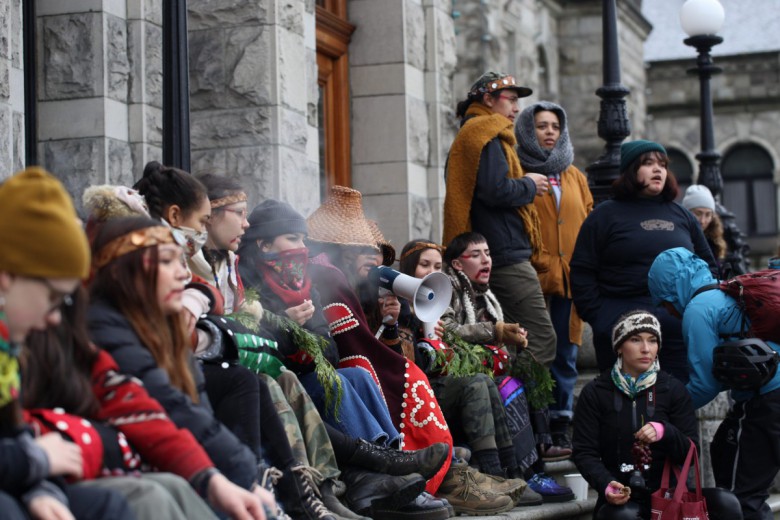“Let’s show it to the west and to the east that Regina can speak from the heart” – Elder Bob Smoker
The small, northern Ontario community of Attawapiskat declared a state of emergency after 11 young people attempted suicide on the evening of April 9, 2016. Following a surge of national and international media attention shedding light on the conditions facing youth on Northern Ontario reserves, grassroots activists gathered at rallies and occupations at Indigenous and Northern Affairs Canada (INAC) offices countrywide. INAC’s mandate, derived in part from the Indian Act, controls almost all legal facets of life for First Nations people.
The stream of occupations of the INAC offices began with the high-profile nine-day occupation of INAC’s regional office in Toronto in mid-April, and solidarity actions spread to Vancouver, Winnipeg, Gatineau, and Regina.
In Regina, following an initial rally on Friday, April 15, members of the community began to organize an occupation camp in front of the INAC office on Albert St., the busiest street in the downtown area. By the following Monday, Colonialism No More – Solidarity Camp Regina was formed.
In anticipation of the public demonstration on April 15, the INAC office in Regina closed its doors to the public, and it remained closed for the next 10 business days. The building’s property manager installed a fence that pushed demonstrators onto the sidewalk, but within 24 hours and following strong pressure from the public, the fence was removed. It wasn’t until the second week of the occupation that INAC finally agreed to meet face to face with some of the camp’s organizers and hear their demands, one of which was for INAC to re-open their doors to the public.
Although most occupations elsewhere in Canada have ended, both Winnipeg and Regina are still standing. I spoke to several vital members in Regina about the camp.
Voices from the CampPrescott: A member of the Canupawakpa First Nation (MB) and a staple for the camp’s overnight occupation.
Robyn: A member of the Whitefish River First Nation (ON), a founding member of the occupation, and a representative for the camp’s media relations.
Su: A member of the Athabasca Chipewyan First Nation (AB), a founding member of the occupation, and a longtime activist.
Elder Bob Smoker: A member of the Kahkewistahaw First Nation (SK) and the camp’s Elder-in-residence.
What inspired you to participate in the occupation camp?
Elder Bob Smoker: I have previous history in movements that deal with colonization and speaking up for the people. I didn’t know I’d have the role I have [laughs], but we’re seeing to the cultural side of things. It helps the spiritual component of the camp, and we’re working collectively at giving the voice back to the people.
Robyn: For me, it was seeing the other communities’ desire to amplify the voice of the Attawapiskat youth. I had mentioned the idea to my non-Indigenous friends and allies. With specific help from my friend Andrew Loewen, the group became legitimate. His belief in the group made me believe in it, too. And one Monday morning at 7 AM, there we were setting up tents and occupying INAC. Some of the participants are people I’ve known for years, but I never expected to meet people like Prescott and become as close as I have with Elder Bob Smoker.
Su: Robyn forced me to come [laughs]. No, what inspired me to come to the camp was that enough is enough. It’s time for the grassroots voices to be heard. I’ve been waiting for a movement like this for years. Like INAC said, it’s the first time they’ve met with the grassroots people.
Prescott: Everything happens for a reason. I left a lifestyle that was very undesirable and I had nowhere to go. I didn’t really have much direction until I walked by the camp and felt inspired. I wanted to participate and offer my assistance in any way I could. The strength I’ve received from the camp has been overwhelming. It’s raised my spirits. I feel stronger. I feel more confident. It’s really given my life meaning. I felt like I was broken. Now I feel like I’m standing up for something and really making a difference.
What has the response from the public been?
Robyn: It’s been largely positive. We’ve been overwhelmed with the support. People drop off food and certain unions have stepped up and have supported us in very big and very public ways. Our Facebook page is widely shared and a video made by a member of the group has had over 5.4K views the last time I checked. People are ready to listen and are willing to support, and it’s been great.
Can you describe the politics of the camp and explain how responsibilities are met?
Prescott: We are a consensus group. There isn’t a decision that happens without it being brought to everyone in the group. We are not politicians, but we are the voice. We have a no drinking and drugs policy. We are here in a peaceful way to be heard and bring awareness. We all have our own responsibilities. Everyone pitches in. Everyone invites people in, talks to people, and educates them on why we’re here.
How has INAC’s participation influenced the camp?
Robyn: It’s brought forth a few new leaders among us. It’s given them a voice at the table with INAC and allows them to bring these amazing ideas in a way that challenges the status quo and how INAC does their job. They’ve challenged INAC to really think outside of the box, which INAC says they’re trying to do now.
Where do you envision the camp going in the future?
Su: We’re going to take over Canada [laughs]. I think this camp is not going to end in a specific way, because I really believe we’ve started an autonomous peoples’ movement and whether the tents are up or the tents are down, the movement will only grow stronger. For this kind of movement, there ain’t no power like the power of the people and the power of the people don’t stop.
Elder Bob Smoker: It will continue even if we have to dismantle the camp – even though we don’t want to – and the main theme and idea will always remain. We are part of a domino effect and are a peaceful group. A lot of our members have gone to sweats and offered tobacco and cloth and have kept the spiritual side strong. It’s a new beginning and a new future for our children. I’ve never envisioned something like this, but it’s a new era. If we keep that mindset, we keep our sovereignty and expression of human rights. And I’ll still be, as long as I’m around, continuing that.
Get in touch with Colonialism No More – Solidarity Camp Regina at [email protected] or follow them on Facebook and on Twitter for news and resources, updates on the list of demands, and ways you can help and support.


